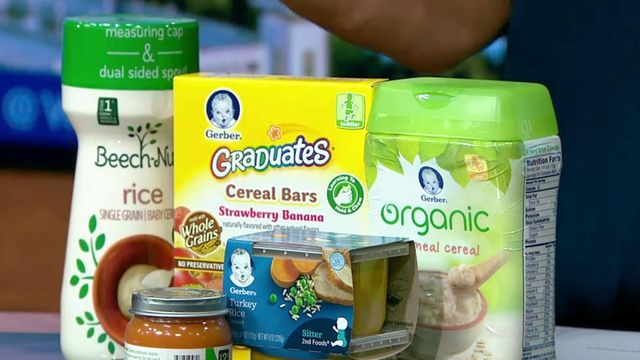FDA Proposes Limits for Lead in Baby Food
The Food and Drug Administration on Tuesday proposed maximum limits for the amount of lead in baby foods like mashed fruits and vegetables and dry cereals after years of studies revealed that many processed products contained levels known to pose a risk of neurological and developmental impairment.
The agency issued draft guidance, which would not be mandatory for food manufacturers to abide by. The guidelines, if adopted, would allow the agency to take enforcement action against companies that produced foods that exceeded the new limits.
“This is really important progress for babies,” said Scott Faber, vice president of public affairs for the Environmental Working Group, a nonprofit organization that had urged the agency to take action to remove metals from foods. “We were grateful that FDA has and the Biden administration has made reducing toxic metals in baby food a priority.”
The new limits, aimed at foods for children younger than 2, do not address grain-based snacks that have also been found to contain high levels of heavy metals. And they do not limit other metals, like cadmium, that the agency and many consumer groups have detected in infant foods in previous years.
Jane Houlihan, research director for Healthy Babies Bright Futures, a nonprofit, called the guidelines disappointing. “It doesn’t go far enough to protect babies from neurodevelopmental damage from lead exposures,” she said. “Lead is in almost every baby food we’ve tested, and the action levels that FDA has set will influence almost none of that food.”
She said the limits would address some of the highest levels they had found but more broadly appeared to “codify the status quo.”
The Centers for Disease Control and Prevention has said there is no safe level of lead for children, who more readily absorb the heavy metal. The FDA proposed setting a lead level lower than 10 parts per billion in yogurts, fruits or vegetables and no more than 20 parts per billion in root vegetables and in dry infant cereals.
The limits “would result in significant reductions in exposures to lead from food while ensuring availability of nutritious foods,” according to an FDA news release. The move is part of the agency’s Closer to Zero initiative, which is aimed at reducing the exposure of young children to toxins such as lead, arsenic, cadmium and mercury.
The changes “will result in long-term, meaningful and sustainable reductions in the exposure to this contaminant from foods,” said Dr. Robert Califf, the commissioner of the FDA. The guideline would allow the agency to identify foods as “adulterated” if they contained levels beyond the limits and to then seek a recall, seize products or recommend a criminal prosecution.
The agency estimated that the proposed levels could reduce the dietary exposure to lead for some young children by about 25%. According to the FDA, low levels of lead exposure in children can lead to “learning disabilities, behavior difficulties and lowered IQ” as well as immunological and cardiovascular effects.
In 2020, the FDA set limits for inorganic arsenic in rice cereal for infants, and in April of last year, it proposed maximum levels for lead in juice.
In comments submitted to the FDA on its broader plan, Gerber wrote in 2021 that reducing toxins was difficult because plants absorbed them from the soil as they grew.
“Actions that result in removing baby foods from the diet, whether intentional or not, do not change exposure if these foods are replaced with other sources of the same fruits, vegetables and grains that are prone to having heavy metals,” the company wrote.
A Gerber spokesperson said Tuesday that the company was reviewing the FDA’s proposal and planned to work with the agency “to advance this important effort to continue to reduce the levels of heavy metals in infant and toddler foods.”
Gerber, Walmart and Hain Celestial, which produces Earth’s Best Organic foods, did not respond to requests for comment on the proposal. Beech-Nut Nutrition Co. said in a statement that it was reviewing the guidance and would work with the FDA on “the establishment of science-based regulatory” limits for “naturally occurring heavy metals.”
Attorneys general from New York, Illinois, Pennsylvania, Michigan and other states had weighed in on the overall plan, urging the FDA to post the results of its tests for multiple metals in baby food on its website.
Lead is ubiquitous in the environment from decades of unregulated use in gasoline for cars, farm machinery, aircraft and paint, said Tracey Woodruff, a scientist at the University of California, San Francisco, who studies exposure to toxins.
She applauded the FDA’s goals but said a strict limit would be more effective because the voluntary guideline would require monitoring for possible enforcement.
“Corporations are innovative and know how to tweak what they need to do to meet legal standards and make a profit,” she said.
Rep. Raja Krishnamoorthi, D-Ill., has been a leading voice calling for reductions of heavy metals in baby foods. He and other lawmakers released a report in 2021 showing that baby foods like carrots and sweet potatoes were contaminated with heavy metals.
On Tuesday, Krishnamoorthi said in a statement that he has been pressing the FDA to ensure baby food is safe. He said he remained concerned that the “lead levels announced today are considerably more lenient than those specified in” legislation that he and other lawmakers introduced in March 2021.
Months later, Consumer Reports released tests showing that arsenic remained present in rice cereal meant for babies even after the limit was issued. The group advised parents to favor dry oatmeal as a safer alternative.
Faber, of the Environmental Working Group, said the new guideline would prompt food companies to encourage suppliers to alter their farming practices to reduce the lead levels in food.
“I think that past history has shown that farmers and food companies are very quickly able to change how they grow and process these ingredients to meet tougher standards,” he said. This article originally appeared in The New York Times.











